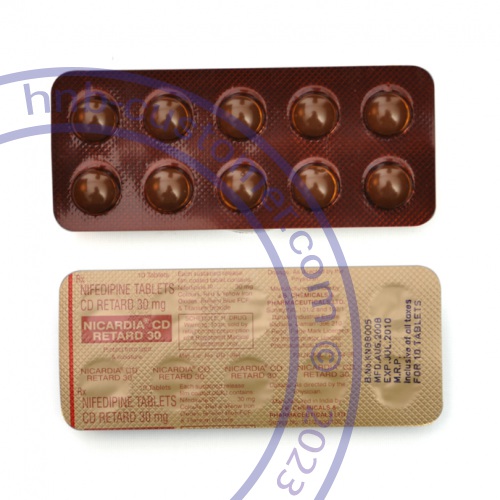

Brand(s):
- Nicardia CD Nicardia Retard Nicardia XL
Manufacturer:
- J. B. Chemicals And Pharmaceuticals Ltd
Disease(s):
- Hypertension / Angina
- We can ship our products to any location worldwide
- Enjoy complete anonymity and robust data security measures
- Exclusive certified products at compelling prices
- Skip the hassle of long queues; get your medicines hassle-free
Adalat CC
nifedipine


Brand(s):
- Nicardia CD Nicardia Retard Nicardia XL
Manufacturer:
- J. B. Chemicals And Pharmaceuticals Ltd
Disease(s):
- Hypertension / Angina
Nifedipine Extended Release Tablet
What is Nifedipine?
Nifedipine is a medication classified as a calcium-channel blocker. Its mechanism of action involves reducing the amount of calcium within heart and muscle cells. This, in turn, leads to relaxation of blood vessels, thereby decreasing the workload on the heart. This medication is primarily used in the treatment of hypertension (high blood pressure) and angina (chest pain resulting from reduced blood flow to the heart).
Important Considerations Before Taking Nifedipine
Before starting nifedipine, it's crucial to inform your healthcare provider about any pre-existing medical conditions. This includes:
- Cardiovascular issues: Such as heart problems, low blood pressure (hypotension), slow or irregular heartbeat (bradycardia or arrhythmia).
- Kidney disease (renal impairment): Nifedipine's excretion is affected by kidney function.
- Liver disease (hepatic impairment): Liver function impacts the metabolism of nifedipine.
- History of heart attack: This requires careful monitoring and dosage adjustment.
- Allergies: To nifedipine, other medications, foods, dyes, or preservatives.
- Pregnancy or plans for pregnancy: Nifedipine's effects on a developing fetus are a concern.
- Breastfeeding: Nifedipine can be passed through breast milk.
How to Take Nifedipine
Nifedipine extended-release tablets should be swallowed whole with a glass of water. Avoid crushing, chewing, or breaking the tablets as this can alter the release profile of the medication and affect its effectiveness. It is vital to adhere to the prescribed dosage and schedule. Do not abruptly stop taking nifedipine; rather, the dosage should be gradually reduced under the guidance of your doctor to minimize potential withdrawal effects. Children require special considerations and should be under the care of a pediatrician when using this medication.
Overdose: In case of suspected overdose, immediately contact a poison control center or emergency room.
Note: This medication is prescribed for individual use only. Do not share it with others.
What to Do if You Miss a Dose
If you miss a dose, take it as soon as you remember, unless it's almost time for your next dose. In that case, skip the missed dose and resume your regular schedule. Never double the dose to compensate for a missed one.
Potential Drug Interactions
Several medications and substances can interact with nifedipine, potentially affecting its efficacy or increasing the risk of side effects. It is essential to inform your healthcare provider about all other medications you're taking, including:
- Barbiturates (e.g., phenobarbital)
- Cimetidine
- Diuretics
- Grapefruit juice (can significantly increase nifedipine levels)
- Local or general anesthetics
- Other medications for high blood pressure or heart problems
- Warfarin
This list is not exhaustive. Provide your doctor with a complete list of all medications, herbs, over-the-counter drugs, and dietary supplements you use, as well as information on alcohol, tobacco, and illicit drug use.
Monitoring Your Condition While on Nifedipine
Regular check-ups with your doctor are necessary to monitor your response to nifedipine. Regularly check your blood pressure and pulse rate, as instructed by your doctor. Know the target ranges and when to contact your healthcare provider if values deviate from the norm.
Drowsiness and dizziness are potential side effects. Avoid driving, operating machinery, or engaging in activities requiring alertness until you know how the medication affects you. Avoid sudden changes in posture (sitting or standing) to minimize the risk of dizziness or fainting, especially for older adults. Alcohol can interfere with nifedipine's effects; therefore, it's advisable to abstain from alcohol while on this medication.
Possible Side Effects of Nifedipine
Side effects requiring immediate medical attention:
- Blood in the urine
- Difficulty breathing
- Rapid heartbeat, palpitations, irregular heartbeat, chest pain
- Skin reactions such as redness, blistering, peeling, or loosening of skin (including inside the mouth)
- Reduced urine output
- Skin rash
- Swelling of legs and ankles
Side effects that usually don't require immediate medical attention (but should be reported if persistent or bothersome):
- Constipation
- Facial flushing
- Headache
- Weakness or tiredness
This is not an exhaustive list of potential side effects.
Proper Storage of Nifedipine
Keep nifedipine out of the reach of children. Store at room temperature below 30°C (86°F), protected from moisture and humidity. Keep the container tightly closed. Discard any unused medication after the expiration date.
```









